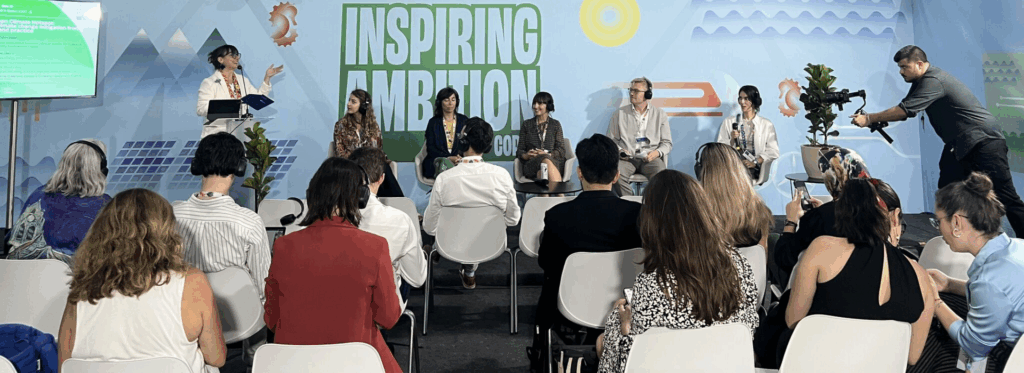At COP30 in Belém, MedECC was featured in two events addressing the region’s climate and environmental challenges. While the Mediterranean does not have a formal negotiation bloc at the UNFCCC, MedECC continues to support the visibility of Mediterranean science in international discussions.
These two events provided complementary opportunities for MedECC to share scientific evidence and contribute to discussions on climate mitigation and adaptation in the Mediterranean.
UfM calls for urgent climate action as Mediterranean Pavilion unifies regional voice and unveils latest scientific findings at COP30
Now in its third edition, the Mediterranean Pavilion brings a unified Mediterranean voice to global negotiations, turning scientific knowledge into concrete action. The Pavilion mobilises governments, regions, cities, financial institutions and civil society, while empowering young people through the UfM Energy & Climate Action Youth Delegate Programme and accelerating bankable projects with the MedBank Toolkit.
During a dedicated press briefing, MedECC joined the Union for the Mediterranean (UfM) to present recent evidence on climate risks and environmental degradation in the region, including rising temperatures, water stress, biodiversity loss, and increasing coastal vulnerability. The scientific findings, drawn from the latest available research, were presented today by Grammenos Mastrojeni, UfM Senior Deputy Secretary General, and Prof. Magda Bou Dagher Kharrat, Principal Scientist at the European Forest Institute’s Mediterranean Facility (EFIMED) and a member of the MedECC network. Their conclusion reaffirm that the Mediterranean is a global climate hotspot.
Average warming in the region has already reached around +1.5°C, with projections ranging from +2.2°C to +5.6°C by 2100 depending on emissions. Precipitation is expected to decline by 10–30%, intensifying water stress across agriculture, energy systems and cities. Biodiversity loss is accelerating on land and at sea, while human pressures exacerbate degradation. Food systems face declining yields in emblematic crops such as olives, grapes and wheat, and shrinking fish stocks increase import dependence. The public health burden is mounting due to more frequent heatwaves, expanding vector‑borne diseases and worsening air quality.
Coastal risks continue to grow. Sea level in the Mediterranean is rising by approximately 2.8 mm per year today, and a one‑metre rise within this century would redraw shorelines, placing cities such as Alexandria, Venice, Barcelona, Tunis and Izmir at heightened risk, with serious implications for infrastructure, tourism and cultural heritage. With about one third of the region’s population living in coastal areas, up to 20 million people could face permanent displacement by 2100 if current trends persist.
The UfM reiterates that safeguarding Mediterranean people, economies and ecosystems requires faster emissions cuts, scaled adaptation, resilient coastal management and circular economy measures to curb pollution—underpinned by strengthened regional cooperation to mobilise finance and share solutions.
Spanish Pavilion Side event: “The Mediterranean Climate Hotspot: mechanisms to advance climate change mitigation from science and practice”
At a side event hosted by the Spanish Pavilion, three MedECC contributors — Alicia Pérez-Porro (CREAF, Spain), Anna Pirani (CMCC, Italy) and Elena López Gunn (Real Instituto Elcano, Spain) — took part in a discussion on the Mediterranean as a climate and governance hotspot. The session explored how scientific evidence can support effective mitigation and adaptation strategies in a region facing rapid environmental change.
Moderating the session, Alicia emphasised the importance of science-policy interfaces, with MedECC serving as the Mediterranean region’s backbone SPI: bridging knowledge gaps, incorporating non-English literature, and providing a scientific basis that can help Mediterranean countries strengthen their NDCs. In the absence of a Mediterranean negotiation bloc, MedECC plays a key role in ensuring that Mediterranean scientific evidence remains visible and relevant in spaces like the UNFCCC COPs.
The event also offered an opportunity to present the ongoing development of the Second Mediterranean Assessment Report (MAR2), with the participating authors having recently attended the First Author Meeting held in Marseille from 5–7 November 2025.
The session further highlighted the need for integrity, transparency, and scientifically grounded approaches to ensure that mitigation efforts are credible and additional, the need for the involvement of local communities, urban and rural stakeholders, and youth initiatives, reflecting the realities of those most affected by climate change. These key messages are also reflected in findings from our reports on coastal risks and on the climate-wefe nexus, especially when assessing adaptation and mitigation solutions.

